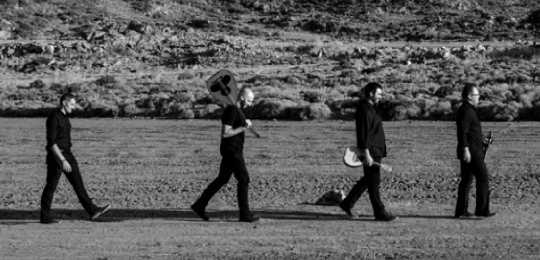|
Stelios Petrakis is top of the tree among Cretan musicians and instrument makers. He’s particularly known as a leading player and maker of Cretan lyras, including the lyra with sympathetic strings that he and Ross Daly developed, but he’s also master, and luthier, of laouto and saz, and here he brings in a new development of his, a bass lyra he calls ‘Cretan cello.’
This is a beautiful, richly textured, dazzlingly played album, of mostly his own compositions which, like his instruments, embrace and expand on the finest and subtlest parts of Cretan tradition, in instrumentals and songs with lyrics traditional or by his brother Yannis Petrakis.
His quartet consists of himself on the aforementioned instruments, with Dimitris Sideris (laouto and vocals), Michalis Kontaxakis (mandolin) and dancer Nikos Lembesis. For this album they’re joined on some tracks by singer Vasilis Stavrakákis, great Iranian percussionist Bijan Chemirani on zarb, daff and bendir, Charalambos Paraskakis on askomandoura (Cretan bagpipe), and Valencian musician and recording engineer Efrén López on pandero.

|
"Syrtos ts' Apomonis"
|
The opener is the title-track, “Spondi” in which, after a veiled dronal intro, the lyra and laouto track one another in a strong, stately melody underpinned by the deep boom, ripple and slap of Chemirani’s hand drums. Then a wild high-energy fast dance, ever picking up pace, in “Pentozalis,” before the slow, dark, slithering Spanish-tinged tense surge of “Tempranillo” (the Spanish tempranillo wine grape has long been grown in Crete), and the skipping float of “Syrtos ts’ Apomonis” in which the lyra ascends ecstatically after Sideris’s vocal, driven by thumping snapping percussion.

|
|
An ominous soundscape of water and bombing, and a taksim improvisation on laouto from Sideris, precede the song “Kalos Andamothikame” (‘Well Met Are We’), with Stavrakákis’s soaring vocal over deep pulsing instrumentation. The booklet notes tell us it commemorates a story, told by a Cretan during the Occupation, of a wild illicit party in the woods between Cretans and the Italian carabinieri patrol sent to arrest them, involving celebratory if unwise letting off of hand grenades and a spell in the detention cells, and the later death of a friend from a German bomb when he stepped outside a sheltering cave on Kythira.
Each track has a story, told in the elegant hard-back book-style package. “Sto Barbareso Tis Avles” (‘In the Courts of Barbary’) is dedicated to Yemenis Nujood Ali and Nada al-Ahdal, leading figures in the Yemeni movement against the forced and child marriage which as children they managed to escape. The short “Epese to Spiti” (‘The House is Down’), is a spoken description by Mrs Marita Manadaki of the destruction of her father’s house by the Nazis in 1944, and his exclamation of relief because it showed he wasn’t a Gestapo informant (the houses of collaborators were left undamaged).
The story for the fast “Rodó ts’ avgis” (‘Rose of Dawn’) is of a Cretan woman who, telling a rural doctor of nazi atrocities, also mentioned walking two hours in the Cretan mountains’ very cold winter to take food to German soldiers because ‘they’d have died of hunger or the cold, they were just children, they didn’t know what they were doing.’
The closer, “Maleviziotis,” is a thrilling ten-minute tour-de-force featuring breaks by most of the instruments, a triumphant finale to a very fine, very Cretan album.
Find the artist online.
A 2019 live performance of "Maleviziotis" with dancer Nikos Lembesis.
Further adventures:
Stelios Petrakis Quartet live in Cardiff, 2013
Petroloukas Halkias & Vasilis Kostas
Monsieur Doumani
|
